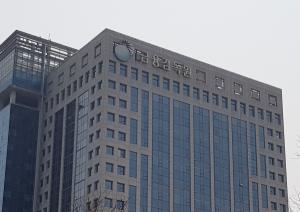Restrictions on employment in the financial sector for three to five years and consecutive terms… One step reduction in the original document

The Financial Supervisory Service issued a censure warning to NH Investment & Securities CEO Chung Young-chae regarding the suspension of redemption of the Optimus Asset Management private equity fund. Rather than the three-month suspension that had been notified in advance, the level was lowered by one level. Following this disciplinary action, CEO Chung Young-chae will be restricted from working in the financial sector for three to five years.
According to the Financial Supervisory Service on the 26th, the Financial Supervisory Service held a sanction review committee on NH Investment & Securities and Hana Bank on the 25th and made such a decision. NH Investment & Securities, the largest seller, was also subject to severe disciplinary action, such as suspension of business, and Hana Bank, a trustee of the Optimus Fund, was also sanctioned for suspension of business. This is the first financial authority sanctions against trustees.
The sanctions were decided on’Response Warning’ for CEO Jung Young-chae. This is one level lower than the original plan for the’three-month job suspension’ that the Financial Supervisory Service notified in advance, but it is classified as severe disciplinary action in that if the sanctions are finalized, employment in the financial sector will be restricted in the future.
The level of sanctions against financial company executives is divided into five stages:’recommendation of dismissal-suspension of work-warning of censure-cautionary warning-of caution, among which, more than the censure warning are restricted from working in the financial sector for three to five years.
The Optimus incident attracted investors saying that they invested in safe public institution accounts receivable, and then invested in private equity bonds of insolvent companies that did not have a business entity, causing damages of hundreds of billions of won. Accordingly, the Financial Supervisory Service’s Inspection Bureau has determined that as Chief Executive Officer (CEO), CEO Jeong was unable to filter out poor funds because he failed to establish effective internal control standards.
However, it is known that the sanctions judges lowered the level of sanctions by one level, reflecting some of the efforts of President Chung and NH Investment & Securities to reduce damage.
It has also been emphasized that NH Investment & Securities is making efforts to protect consumers by publicly expressing its intention to become the largest shareholder of the bridge manager, which will be in charge of transferring and managing the Optimus Fund.
It seems that some of the mitigation was influenced by the voices that voices from inside and outside the financial sector that only the CEOs of sellers are being held excessively responsible for the insolvency of private equity funds.
Copyright © Shin-A Ilbo Unauthorized reproduction and redistribution prohibited
